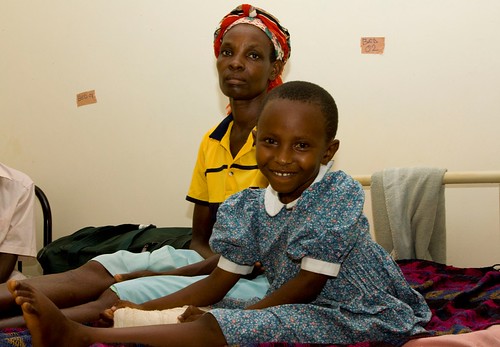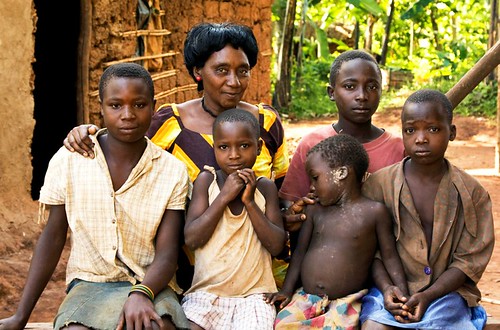On the bed across from us sat a boy of maybe four with his mother; to our right, a six year old girl and her caretaker; a baby to our left with her young attractive mother; on the other side of them beneath a window, a playful toddler who laughed and squinted his face at me for hours, his jah jah at his side.
Recall family members serve as nurses in African hospitals. You need to bring your own nurse, your own food, your own drinking water, your own clothes, your own bed sheets, your own basin, your own soap, your own toilet paper for the latrine outside; besides medicine, only a plain room, mattress and unclean water are provided.
The continent of death abundant, it was not remarkable that three of the five children in the ward were without their birth mothers, and Ester maintained the woman across from us to be the stepmom. She says it’s her first born, but it’s a lie. I watched the boy sit vacantly and tensely that day and the next, not wanting to be touched, never smiling at me or the Hungarian doctor trying for a laugh, not amused by the silly, funny-looking mzungus.
The continent of poverty prolific, Africa is diaperless, the young pissing and defecating wherever. The woman suddenly grabbed the boy and pulled him to the ground, stood him over their basin, grabbed his penis and made him finish peeing in the tub. I stared at the deep thin welts running across his butt discoloring the dark skin. She set him back on the bed, threw the cloth he had soiled that lined the bed into the basin and walked out the door to clean it in the grass area next to the small buildings that comprised the hospital; the place where family members of the sick cleaned, cooked and rested.

Ester’s eyes followed her out the door.
“Hmm. She can’t be the one. He really fears her. The nurse told her to lay him down and she just ignored her.”
He hadn’t eaten all day in prep for surgery, and it was well past two in the afternoon. I felt sorry for him. Sitting down on the little bed, I put my arm around his tiny frame, but his face turned and he cried. He stopped when the mother returned several minutes later and resumed sitting next to her stiffly, the same anxiousness returning to his face.
Richard sat on the bed with Ester listening to my IPod. I looked at Ester.
“Where are you going to sleep?” The only beds left were for the very young.
“We aren’t admitting anymore,” a nurse lounging on a bed volunteered, as if the problem were not having any beds at all, rather than only very small ones. Ester didn’t seem to mind the prospect of sleeping in discomfort; this was Africa.
I talked to the sweet girl next to me. Veronica was behind in school, still in baby class, because of ongoing problems with the foot, but she seemed bright and knew some English despite her disrupted schooling. The woman attending to the girl talked to Ester in Swahili; they had come all the way from Kenya.

The woman wasn’t her mother; the mother had died after donating her bone to the girl who still wasn’t better. The story didn’t quite make sense, maybe something was lost in translation, maybe the caretaker didn’t understand what happened. But the girl was an orphan and had been sick for a while.
I told Veronica her dress was pretty. It was periwinkle decorated with delicate pink and white flowers and ruffled at the bottom. It reminded me of a dress I had as a child. I told her so, and asked her if she took it from me and demanded it back. She smiled a lot, quickly and sincerely, but shyly.

I sat with the women and their little patients in the light room passing the hours staring at the nicely painted walls, a novelty in Africa, making small talk, a television in an African hospital room unthinkable. Bored, I went outside to pace.
I came back and Veronica sat with headphones at her ears and the IPod gently in her lap; Richard had let her use it. I eyed the toddler under the window as he covered and uncovered his face over and again squealing at me. I started to read a book, just a few pages. I looked up and Veronica was smiling hard.
“She really likes it,” Ester said laughing referring to the song that just came on. I picked up the IPod to see what she enjoyed so much, thinking it was an R&B artist much beloved by Africans: Alicia, Beyonce, Mariah. I was shocked.
Lake of Fire, Nirvana
“Okaaaay! My little rock and roll girl!” I exclaimed to her. She couldn’t control her pleasure, her face and eyes wild with excitement.

We were discharged the day after surgery, but have made the journey back each day since to have the wound checked and redressed. We ride the bodas and taxis through the dusty red roads into the village of Buikwe, Richard hobbling to and from transport on one crutch.
The day after surgery I looked for the Hungarian doctor that attended to us. It was Saturday and he was off, but was staying in the large home for staff behind the hospital on top of the slope; upon hearing of our arrival he donned the green scrubs.
He greeted us with usual cheerfulness, funny and slightly goofy, peering through syrupy glasses and speaking with a bulky accent. We sat on the bench outside the dressing room, which he entered to prep for us, but reemerged irritated and stressed. He looked down at me.
“I do it myself. Sorry, you wait.” I looked through the door; a Ugandan doctor attending to a wound.
He walked away with another Eastern European doctor, the two gesturing fervently. They weren’t happy about something. To my side a small crowd gathered, Richard stood to join them. Something of interest to pass the time, I stood up too to spectate.
A few men stood on a small grass area in front of one of the wards inspecting and fidgeting with a circular bundle of thin pieces of hard wood. I was disinterested. Who cares about construction? Then I noticed the purple and indigo cloth sticking out from the middle of the stack. There was a shape beneath it. Oh. A head.
I hadn’t seen a body yet in Africa, but I heard about them quite a bit. Ester would tell me sometimes, They found a body today. They found a body here. They found a body there. There were two bodies in town today; two people killed by cars. They took the body back to the village. And so on.
I knew there not to be hearses and proper funeral homes here, bodies transported on the backs of boda bodas and maybe in a car if the deceased was lucky then stuffed into a wooden coffin and finally into the soft rusty soil next to an ancestral home.
Here was my first; wrapped in a cloth, then secured in bound thatch work. It sat there for several minute and was then carried away by five men. The frame was hard to see, but seemed small, like that of a slight woman.
The Hungarian doctor returned.
“These African doctors are killers,” he proclaimed as he motioned us into the dressing room that was being cleaned by a nurse.
“I’ve been here for four weeks and have had enough. I go back to my clinic in Nairobi, but first I have to go to Sudan,” he explained to me.
“Oh. You live in Nairobi?”
“Yes, I have a family there. I came here for a friend.”
“Well, you and the staff are doing a great job. The community would not have these services otherwise. I have been to other clinics and they are awful. The doctors tell people to leave for no reason. They won’t take care of them because they don’t care.”
He looked at me over his glasses as he pulled at the bandage.
“Yes, I know. These African doctors,” he said shaking his head.

I didn’t ask him why they were killers; if it was related to the body I had seen, or if it was prompted by the Ugandan staff in the room earlier; or maybe it was both and probably more. I just let it go. You do that a lot here, accept the shameful and bizarre, the toil and demise; the continent of desperation lavish.
People cry, people moan
Look for a dry to place to call their home
Try to find some place to rest their bones
All the angles and the devils try to make ‘em their own







She found a Nirvana all her own even if just for a moment.
ReplyDelete-h
LOL! True and poetic! ;)
ReplyDelete